Supporting Cancer Patients together with employees on a global scale
- Japan
- Asia & Oceania
- Worldwide
- Americas
English
Global Network
The Sustainable Development Goals (SDGs) aim to solve global issues such as poverty, inequality, and climate change.
They are made up of 17 goals and 169 targets.
Masahisa SATO,
Ph.D., Professor, Tokyo City University.
Masahisa SATO,Ph.D., Professor, Tokyo City University.
Poverty is more than just a lack of income or not having the livelihood to sustain a sustainable life. Poverty has a deep relationship with a number of issues, including hunger, limited access to education and other basic services, social discrimination, and disasters. In addition to creating equal employment through economic growth, it is essential to provide economic support and reduce losses from disasters through the enhancement of social security systems and disaster preparedness.
This goal sets targets to end extreme poverty and to ensure that people continue to live sustainable lives.
Eating is essential for survival. However, the soil, freshwater, oceans, forests, and biodiversity responsible for growing our food continue to be degraded by human activities and climate change. As the world's overall population grows, we need to reconsider the way we produce, procure, and consume food, and practice resilient and sustainable agriculture and food production in order to provide nutritious and adequate food for all people and continue sustainable development.
This goal sets targets to create a society in which all people have sustainable access to sufficient, nutritious food and can live healthy lives.
In developing countries, many small-scale producers live in poverty. Increasing productivity and income will make farming and livelihoods sustainable.
Maintaining biodiversity, including plants, leads to sustainable food production.
There are many things we need to do to ensure for the people living today as well as the new lives who will create the future to be born safely, grow up healthy, and lead to the next generation. This includes safe childbirth, care for newborns and infants, combating horrific epidemics, preventing tobacco and alcohol abuse and the non-infectious diseases they cause, ensuring access to quality essential health-care services, and preventing traffic injuries.
This goal sets targets to build a society in which people live long, healthy lives in relationships with others.
Learning contributes to problem-solving, value co-creation, and improvements in our immediate surroundings and global issues. In order to support sustainable development, it is essential to ensure that everyone has the opportunity for quality education from an early age and throughout their lives. We also should provide opportunities and environments that allow people to acquire basic reading, writing, and calculation skills, as well as high vocational skills.
This goal sets targets for everyone to acquire the knowledge and skills necessary for the development of a sustainable society and participate in society.
Gender equality is a necessary foundation for a sustainable world, where all people, regardless of gender, can have equal rights and opportunities. However, in the world, many women and girls still suffer from discriminatory practices, laws, physical or sexual violence, such as not being allowed to attend a school or participate in politics because they are women. Providing equal opportunities for education, healthcare, and professions, and promoting women's participation in political and economic decision-making promote gender equality.
This goal sets targets to create a society in which all people can play an equal role in society without gender discrimination or violence.
Water (freshwater) is not only necessary for us to drink, but also essential for hygiene such as washing hands and toilets. It is also important for industries, such as agriculture and production, to nurture a variety of life forms and maintain ecosystems. Sustainable development requires clean and efficient use of water from water sources to the river's mouth so that all living things can live in harmony.
This goal sets targets to ensure that all people have access to safe, adequate water and sanitation.
Open defecation poses the risk of contamination of groundwater and agricultural products, as well as infectious diseases.
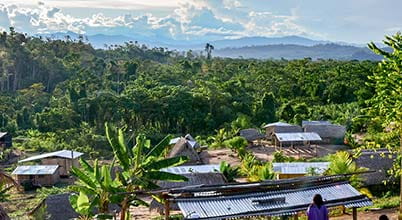
Preserving the Rainforest Through Partnerships

Restoring and Preserving Lost Forests

Restoring Declining Forests and Preserving Ecosystems
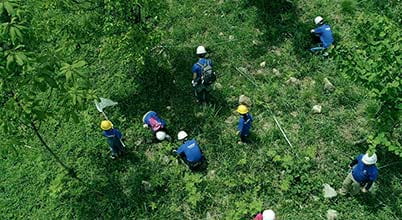
Brother’s Forest, Gujo
Energy is essential for human beings to live and work culturally. It is used for all kinds of activities, from home cooking and heating/cooling to industry and transportation, but if all our energy needs depend on fossil fuels alone, it will lead to air pollution and accelerated climate change. We must increase the supply and use of renewable and clean energy in order to make life sustainable for all people.
This goal sets targets to ensure that all people can use energy sustainably while continuing to live a quality life.
The global economy has continued to grow over a long history. While there are people living in affluence due to economic growth, there are also many people who are stuck in a vicious cycle of poverty due to lack of jobs or low wages even when they do have jobs, creating inequality among people.
This goal sets targets to achieve sustainable economic growth.
It will create a resilient economy by fostering diverse industries.
It can shorten the working hours per unit and improve wages.
If workers can work for a long time without worries, their families will be stable and the next generation can grow.

Improving Machining Tool Productivity and Reducing CO2 Emissions

Work Towards Eliminating Child Labor, Forced Labor, and Conflict Minerals

Provide Fair Opportunities for All Employees
Technological progress is the foundation of our efforts to achieve the Sustainable Development Goals (SDGs). Technology and innovation can only be developed after the industry is created. In order for industry and people's lives to develop sustainably, infrastructure, such as roads, communications, electricity, and water supply, is essential for life and industry.
This goal sets targets to nurture industry and aim for innovation to achieve sustainable economic growth.
The manufacturing industry is considered to contribute the most to industrialization because it can generate more employment through the value chain.
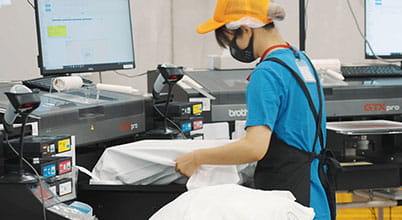
What You Need, in Just the Amount You Need. Contributing to a Sustainable Apparel Industry.

Resource-Saving Printing with Digital Printing

Improving Working Environments While Reducing Environmental Impact
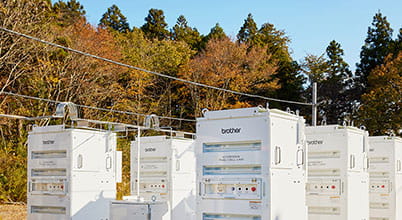
Approaching a Decarbonized Society With New Infrastructure to Transport Hydrogen Safely and Inexpensively
While achieving the SDGs requires reducing inequalities and ensuring that no one is left behind, inequality within and among countries has always been a problem for the international community. Although there have been positive developments, such as the expansion of trade preferences that do not impose tariffs on developing countries' exports, and the narrowing of income disparities in some countries, inequities persist, including income, assets, health care, and education.
This goal sets targets to reduce inequality through equal opportunity, equality of outcomes, and the like so that no one is left behind.
It will regulate the economic and financial system so that it does not favor wealthy developed countries.
Cities are the basis of many activities such as education, culture, and commerce, and they have the power to enrich and develop people's lives, but the centralization of the city also causes various problems. Efficient and effective urban planning is necessary for the sustainable operation of safe and comfortable cities that do not place a burden on environment and resources.
This goal sets targets to create sustainable cities.
Unsanitary and unsafe housing complexes are breeding grounds for epidemics and crime and increase the damage caused by natural disasters.
It will provide educational materials for history and generate industries as tourism resources.
We consume and produce regularly in our daily lives and in industry, but resources are finite. Therefore, we must reduce waste and pollution while pursuing sustainable consumption and production by "Doing more and better with less." Companies and consumers must educate themselves on sustainable consumption and environmentally-friendly lifestyles, and work together to co-create a lifestyle that supports the value chain.
This goal sets targets to reduce the use of limited resources and make the best out of them.
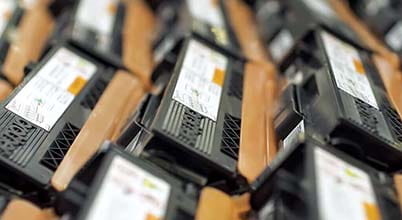
Expanding the Circle of Recycling in the Printing Business

The Challenge to Create Eco-Friendly Products

Reducing Waste Through Traceability

Establishing Long-Term Relationships of Trust Through ESG Information Disclosure
Climate change is causing enormous damage, affecting the lives of everyone, and it will be greater in the future than it is today. Greenhouse gas emissions are at an all-time high, and it is highly likely that the average global temperature will rise by three degrees throughout the 21st century. Every 1 degree Celsius increase in average temperature, for example, is estimated to reduce grain yields by about 5%, so measures to mitigate climate change will lead to better and more sustainable development for all people and the planet's ecosystems.
This goal sets targets to mitigate climate change and strengthen our adaptive capacity to climate-related disasters.

Smaller Packaging Makes Everything More Compact

Towards a New Common Sense in Power Saving Technology

Environmental Performance of Printers Changed by Airflow

The Challenge to Meet Europe's Strict Environmental Standards
The oceans, which account for 70% of the earth's surface area, store 97% of the earth's water and make the earth habitable for humankind. The weather, the water we drink, much of our food, and even the oxygen in the air we breathe are all due to the abundance of the oceans. Seafood and other marine resources are the world's largest source of protein for humans. However, the abundance of the oceans and their ecosystems are being harmed by garbage pollution caused by marine plastics, eutrophication, and ocean acidification caused by increased CO2 emission.
This goal sets targets to sustainably use marine resources while protecting the abundance of the oceans and its ecosystems from pollution and acidification.
Land, which accounts for about 30% of the Earth's surface area, provides us with a place to live and a stable source of food. Forests, which cover about 30% of the land area, are home to more than 80% of the Earth's plants, animals, and insects, and protect biodiversity. They also play an important role in reducing climate change by absorbing and storing CO2. However, 13 million hectares of forests are lost every year to human development and natural disasters such as droughts, and approximately a quarter of the Earth's land area is now desertified or affected by desertification.
This goal sets targets to protect and restore forests and preserve the ecosystems that live there, while also restoring the land devastated by desertification and natural disasters.

Restoring Declining Forests and Preserving Ecosystems

Brother’s Forest, Gujo
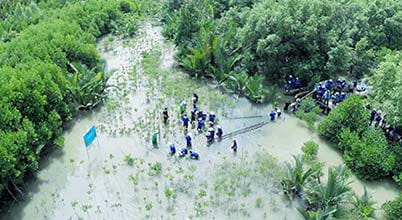
Mangrove Forest Restoration Project: Thailand
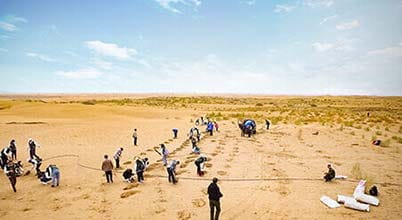
Preventing Desertification and Improving the Environment and Local Lives
To promote a society where all people live in peace and no one is left behind, we must work to reduce violence, especially the abuse of children who are most vulnerable to violence, combat human trafficking, and sexual violence, and ensure that all people have access to justice. Providing legal identification, such as birth registrations, and developing transparent and public human rights institutions are also essential to ensure the fundamental human rights of individuals.
This goal sets targets to achieve a peaceful and sustainable society, reduce violence, and protect people and children from its effects while ensuring basic human rights for all.
Achieving the SDGs will require partnerships between governments and local governments, the private sector, and civil society. Moreover, governments of developed countries and their private companies and organizations supporting developing countries with financial, scientific and technological, trade and capacity development support will expedite the achievement of the SDGs on a global scale.
This goal sets targets to work towards in partnership, extending globally beyond national borders to national and local levels, in order to achieve a sustainable society.